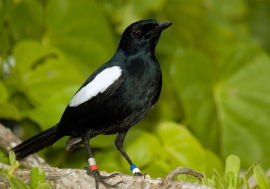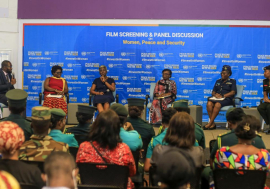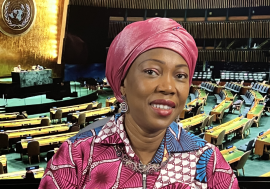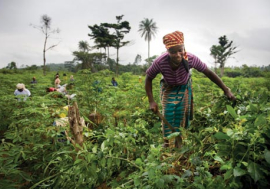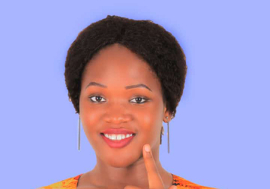Annan urges increasing women in UN peace operations
Noting that, "the differential impact of conflict on women and girls calls for specific responses from the international community," UN Secretary-General Kofi Annan has unveiled a score of recommendations to strengthen the legal protection and physical security of women in conflict situations, and expand their roles in UN peacekeeping and peacebuilding operations. If adopted, the proposals, presented to the Security Council on 16 October, could produce sweeping changes in UN peacekeeping missions and greatly increase the number of women in leadership positions. The recommendations are intended to implement the Council's landmark October 2000 Resolution 1325, which recognized both women's special vulnerability in wartime and their ability to contribute to the maintenance and promotion of peace (see Africa Renewal, January 2001).
Mr. Annan welcomed the expansion of international law to include rape, forced prostitution and trafficking in women and girls as war crimes and crimes against humanity. The presence of gender advisers and gender affairs units in some recent peacekeeping operations, including those in Sierra Leone, Bosnia and Herzegovina, and Timor-Leste, he said, had strengthened the effectiveness of those missions. But he reminded the Council that despite the authorization of more than 50 peacekeeping missions since the UN's inception, "none have included a commitment to gender equality as part of a mission's mandate."
Key recommendations include:
- Explicit Security Council condemnation of sexual violence and other crimes against women and girls and demands that parties to conflicts act to prevent such crimes.
- Exclusion of crimes against women from amnesty provisions of peace agreements and prosecution of such crimes by ad-hoc judicial tribunals.
- Inclusion of women in formal national and international peace processes and measures to ensure that UN-brokered peace agreements systematically address women's needs and priorities in the post-conflict era.
- Incorporation of gender perspectives in all peacekeeping mandates and adequate staffing and funding of gender activities.
- Vastly expanded training for all peacekeeping personnel on gender and women's rights, and strengthened disciplinary procedures to end sexual exploitation and abuse by peacekeepers.
- Involvement of national and community-based women's organizations in the design and delivery of humanitarian assistance and free access to vulnerable women and girls by international humanitarian and human rights organizations.
- Inclusion of women and child ex-combatants, "camp followers" and families in disarmament, demobilization and reintegration programmes and development of programmes to respond to conflict-related domestic violence.
- Identification of legal and social barriers to women's education and employment opportunities, action to address those barriers and steps to ensure that women are involved at all levels in reconstruction and rehabilitation programmes.
Room for improvement
Mr. Annan readily conceded that there is much room for improvement in the participation of women in UN peace operations, from appointment of women heads of mission to deployment of women as peacekeeping soldiers and civil police. He acknowledged that just one woman currently serves as a head of mission or special representative, and only five have ever held such a position. Mr. Annan pledged to set "concrete targets" to achieve gender parity in the number of special representatives and special envoys by 2015 and urged countries contributing troops and civilian personnel to peacekeeping missions to step up recruitment of women.
According to a report by two independent experts, former Finnish Defence Minister Elisabeth Rehn and former Liberian Finance Minister Ellen Johnson Sirleaf, women comprised only 0.1 per cent of UN military peacekeeping personnel between 1957 and 1989. In 2000, they made up just 3 per cent of military and 4 per cent of police personnel in peacekeeping missions. The problem is not a shortage of qualified women, they argued, but an "old boys network" that discriminates against women and mistakenly sees peacekeeping as fundamentally a military operation. "Contemporary peacekeeping requires skills that can lead a war-torn society through a process of nation-building, economic development and reconstruction." With those skills, they concluded, women and men are equally endowed.







